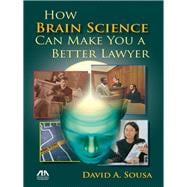
| Acknowledgments | p. ix |
| About The Author | p. xi |
| Introudction | p. xiii |
| Lawyers as Teachers | p. xiv |
| Why This Book Can Help | p. xvii |
| Understanding Your Brain | p. 1 |
| Keep Your Brain Nourished | p. 2 |
| Know Your Own Sensory Preference(s) | p. 7 |
| Know Whether You Are Left-Brained or Right-Brained | p. 10 |
| Assess Your Creative Traits | p. 15 |
| Learn How to Improve Your Memory | p. 22 |
| Using Your Brain in the Workplace | p. 27 |
| Understand How Hemispheric Preferences Can Affect Your Workplace | p. 28 |
| Use a Whole-Brain Leadership Approach to Bring About Change | p. 29 |
| Hire People Whose Thinking Patterns Are Different from Your Own | p. 34 |
| Create Whole-Brained Teams | p. 35 |
| Control the Amount of Stress in the Workplace | p. 38 |
| Remember That Laughter Is Powerful Medicine | p. 41 |
| Walk around the Room to Make Better Decisions | p. 42 |
| Applying Brain Research to Your Practice | p. 45 |
| Keep Sensory Preferences in Mind When Planning Your Presentations | p. 46 |
| Design Your Presentations to Address the Whole Brain | p. 48 |
| Use Graphic Organizers to Make Your Points | p. 51 |
| Limit Your Talking Points to between Five and Seven Items: Less Is More | p. 62 |
| Limit your Presentation Time to between 10 and 15 Minutes: Shorter Is Better | p. 63 |
| Strive for Sense and Meaning | p. 66 |
| Keep Your Vocabulary Simple to Help Non-Lawyers Make Sense of What You Say | p. 68 |
| Start With the Simplest When Presenting Several Concepts | p. 69 |
| Remember That Threats and Emotions Affect Memory | p. 70 |
| Recall That We Remember Best the First and Last Parts of a Presentation | p. 72 |
| Present New Information First and Do Not Solicit Guesses | p. 75 |
| Take Breaks in Longer Presentations | p. 76 |
| Be Aware That the Time of Day Affects Attention and Memory | p. 77 |
| Make Your Most Important Presentations in the Morning and Try to Avoid the Time Just after Lunch | p. 79 |
| Beware of False Memories (Confabulation) | p. 80 |
| Strive for Positive Transfer and Avoid Negative Transfer | p. 85 |
| Use Your Listeners' Past Experiences to Help Them Remember | p. 87 |
| Avoid Presenting at the Same Time Two Concepts That Are Very Similar | p. 89 |
| Use Metaphors to Enhance Transfer | p. 92 |
| Putting It All Together | p. 97 |
| Use a Framework Based on Research on Learning to Design Your Presentations | p. 98 |
| Ask Yourself These Important Questions When Planning Your Presentations | p. 104 |
| Beware the Dangers of Success | p. 106 |
| Appendix | p. 109 |
| Glossary | p. 117 |
| Recommended Reading | p. 121 |
| Index | p. 123 |
| Table of Contents provided by Ingram. All Rights Reserved. |
The New copy of this book will include any supplemental materials advertised. Please check the title of the book to determine if it should include any access cards, study guides, lab manuals, CDs, etc.
The Used, Rental and eBook copies of this book are not guaranteed to include any supplemental materials. Typically, only the book itself is included. This is true even if the title states it includes any access cards, study guides, lab manuals, CDs, etc.